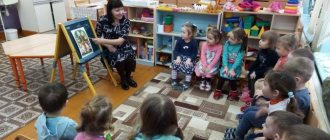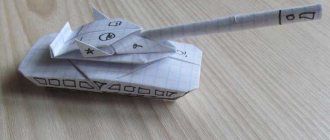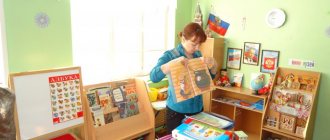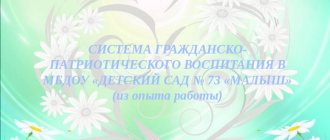Tasks:
- Obtaining and expanding the knowledge of students and pupils about Russia: its history, traditions, culture, law, etc.
- Formation of patriotic feelings and consciousness of students on the basis of historical values and the role of Russia in the destinies of the world, preservation and development of pride in their country, its outstanding achievements in the field of politics, economics, science, sports, culture.
- Instilling a sense of pride, deep respect and veneration for the symbols of the Russian Federation, historical shrines of the Fatherland.
- Cultivating international feelings in students using the example of acquaintance with Udmurtia and the city of Izhevsk.
- Formation of a humanistic attitude towards the surrounding world and people.
From the experience of working as a class teacher. Patriotic education of schoolchildren
Patriotic education of schoolchildren.
From the experience of working as a class teacher. Author: Bitkova Lyudmila Vasilievna, mathematics teacher, municipal budgetary educational institution “Lesnaya basic secondary school”, village of Lesnoy Zubova - Polyansky district of the Republic of Mordovia. Description of the material: In the work of every teacher there is a difficult, but very important mission - to be a class teacher. I have been this throughout my entire teaching career. The educational activities of the class teacher are varied. This paper summarizes my experience in patriotic education of children at school. This material will be useful to class teachers, educators, and organizers of educational work.
Relevance of the topic: 21st century – the century of computerization, innovation, new technologies. This is important, this is modern. But the problem of education remains one of the most important problems at this stage of time. The problem of patriotism in our time is one of the urgent and serious problems of society. We must pass the baton of memory, show the younger generation the greatness and dedication of the feat of the Soviet people who won the Victory. By instilling patriotism in children, we also instill spiritual and moral qualities. It's all interconnected. The purpose of the topic: to summarize the experience of the class teacher in the patriotic education of schoolchildren. Purpose of the topic: exchange of experience in patriotic education of schoolchildren.
Description of teaching experience
In one of his speeches, President of the Russian Federation V.V. Putin said:
“We must build our future on a solid foundation.
And such a foundation is patriotism.” The topic of patriotism is equally important for both young people and middle-aged and elderly people.
But patriotic education has always been one of the most important tasks of the school, because childhood and youth are the most fertile time for instilling a sacred feeling of love for the Motherland. Without patriotic education we can lose our country. The word patriotism contains the highest meanings of human existence, associated with the history of the state, with the memory of past generations and their glorious deeds. In my understanding, patriotism is a moral quality, it is an intimate feeling that is located deep in a person’s soul. And patriotism is judged not by words, but by a person’s deeds. Our society is experiencing a spiritual and moral crisis. Aggression and immorality are consuming the younger generation. They are trying to remake modern history by reducing the role of our country in the Second World War. Mainly pro-American values, alien to the Russian mentality, are being introduced into the public consciousness, displacing Russian history, culture, and traditions. Modern youth have access to various sources of information, which they do not always know how to navigate correctly. There is a need for a properly organized educational process aimed at developing a sense of patriotism. The Government and the Ministry of Education of the Russian Federation consider patriotic education in school as one of the main tasks of the education of children and youth. In the State Program “Patriotic Education of Citizens of the Russian Federation for 2016-2020” Fr. Today there is a lot of talk about the revival of patriotic education of children and youth. And this is correct, only a person who knows and respects the history of his Motherland, his people, his family, is proud of the glory of his ancestors, worries about his country, can be a true citizen, capable of taking on the burden of responsibility for Russia. A child should know the heroic pages of his family’s history, feel pride in loved ones, which will ultimately lead to the development of such a great feeling as love for the Motherland. Therefore, the role of the class teacher in the education of the younger generation is enormous - he can become a unifying force and support for parents and children. Throughout my entire teaching career (which is 43 years), I have been working with children on civic and patriotic education. Education work is carried out all year round and therefore I have drawn up a program in this area. The goal of the program: to improve the system of patriotic education, to develop high feelings of patriotism and civic responsibility among the younger generation, and to create a system of value orientations. To achieve this goal, I solve the following tasks: - stimulate cognitive interest in the historical past and present of the country, region; — I form the ability to communicate, empathy, moral education, — I develop creative abilities, introduce the traditions of the region, country, and the achievements of people; — I cultivate hard work and a caring attitude towards the results of labor; — I teach to take care of my school, to be proud of the history of my school; — I teach respect for the public domain; — I instill respect for the culture and traditions of other nationalities; — I instill a feeling of love for my Fatherland. — I develop a sense of national dignity based on a tolerant attitude towards other peoples of Russia. — I instill in children a rejection of aggression, violence and war. — I contribute to the physical development of students, develop a sense of responsibility for their health and lifestyle. When solving the problems of patriotic education, I organize my work in accordance with local conditions and the characteristics of children. I use both traditional and innovative forms of work in my work. Traditional forms of work: classroom hours, using presentations, holidays, conversations, quizzes, exhibitions of drawings, lessons of courage, extracurricular activities on a patriotic theme, publishing wall newspapers. Innovative forms of work: search work, participation in social projects, school conferences, excursion activities with visits to museums, exhibitions, meetings with interesting people, watching videos. Expected results. In the process of implementing the patriotic education program, students should have developed the following personality qualities by the time they graduate from school: - active citizenship;
— the ability to bear personal responsibility for the fate of one’s family and Motherland; - a sense of patriotism, loyalty to the Motherland and readiness to serve the Fatherland; — spirituality, morality, personal and social responsibility; - ability for self-development. In accordance with the goals and objectives of the Program, as well as the expected results, I highlight several areas. Directions of patriotic education
1. Nurturing patriotic feelings through studying materials about the family
Within the framework of this direction: - we study the history of our family through the compilation of geneological trees “My Family Tree”
;
— created a bibliographic album about fellow countrymen of our village, participants and veterans of the Great Patriotic War; — held a competition of essays and arguments on the topic “From the history of the family to the history of the country”
;
— we hold drawing competitions “Mom, Dad, I – our friendly family”
,
“Let there always be a mother”,
etc.;
— we organize joint holidays of parents and children: Day of Knowledge, Mother’s Day, “Day of the Elderly”
,
“Day of Kindness and Respect”
, Family Day, March 8,
“And Mother’s Eyes”
, etc. Learning about your roots, about your ancestors, Children, through the lives of people close to them, learn the history of their Motherland; it becomes closer and more understandable, as it is colored by their experiences.
2. Fostering patriotic feelings through an in-depth study of the history of the school and creating the image of the school
When working in this area, the following forms of educational work were used: - collection of material and design of the stand “They defended the Motherland”
;
— collection of material and design of the “History of the School”
;
— holding professional holidays: Knowledge Day, Teacher’s Day; — holding the “Mercy”
, congratulating school veterans, home front workers, labor veterans whose childhood was scorched by the war.
Experience has shown that patriotic education contributes to the unity of the class team, the spiritual enrichment of the child’s personality, and the manifestation of his best qualities: kindness, responsiveness, mercy, the desire to do good for the older generation. 3. Nurturing patriotic feelings through awareness of involvement in the fate of the small Motherland, its past, present and future.
A system of activities aimed at understanding the historical and cultural roots, awareness of the uniqueness of the Fatherland, its destiny, inseparability from it, the formation of pride in involvement in the actions of ancestors and contemporaries and historical responsibility for what is happening in society, the formation of knowledge about one’s native village, region. In this area, she carried out the following activities: - project “My family during the Great Patriotic War”
;
— collecting material about the heroes of your family and posting this material on the “Road of Memory”
;
— design of a stand about the fellow countrymen of our village “They defended the Motherland”
;
— studying the history of our village; — creation of a video “My great-grandfather is a hero!”
;
— conducting a lesson - travel “Wildlife places of the native land”
;
— drawing competition “Beauties of my land”
;
— conducting a class hour “My native land, my Mordovia”
;
— extracurricular event “Earth Day”
;
— a class hour “The Unknown Soldier”
, — an extracurricular event
“There should be no forgotten heroes in Russia”
dedicated to the Day of the Unknown Soldier; — We are taking care of the obelisk in our village. We hold extracurricular activities near the obelisk.
Many events were held in the school museum.
Everything that children study and learn about in the museum is part of the life of their ancestors, the history of their native land, state.
It is very important to teach us to respect and love the place where we were born and raised, where our ancestors lived. 4. Fostering patriotic feelings through awareness of involvement in the fate of the Fatherland, its past, present and future. Working in this direction, I try to instill in children a love for the Motherland, for the traditions and history of their country. A special place in this direction is occupied by the study of the history of the Great Patriotic War. I believe that holding events for the 75th anniversary of Victory in the Great Patriotic War is ideal conditions for the development of patriotic values among schoolchildren. In this area, we carried out the following events: - Every year on December 3 we celebrate the holiday - the Day of the Unknown Soldier - in memory of Russian and Soviet soldiers who died in combat on the territory of our country or abroad; the “Day of Heroes of the Fatherland”
event with my students ;
— conducted a lesson in courage “Afghan will not be forgotten”
, dedicated to the 30th anniversary of the withdrawal of Soviet troops from Afghanistan, the day of internationalist soldiers; — traditional participation in school events dedicated to the national holiday Defender of the Fatherland Day;
— competition
“Boy – Future Soldier”
;
- holiday of Defender of the Fatherland Day “The Russian soldier is rich in intelligence and strength”
;
— We publish wall newspapers for the holidays.
Every year, on the eve of Victory Day, the guys and I take part in: - the “St. George’s Ribbon”
and
“Immortal Regiment”
;
— in drawing and craft competitions dedicated to Victory Day; Conducted a series of events with children to commemorate the memorable dates of the Great Patriotic War: - conducted classroom hours “Children of Siege Leningrad”
,
“Leningrad during the Siege”
, dedicated to lifting the siege of Leningrad;
— cool watches
“You survived, soldier”
,
“Children of Stalingrad”,
dedicated to the Battle of Stalingrad;
— a lesson in courage “Bells of Our Memory”
, dedicated to the battle for Moscow;
— extracurricular event dedicated to Victory Day “We will never forget this”
;
— historical and musical lounge “Songs scorched by war”
;
— historical and literary lounge “Spiritual Roots of Victory”
;
— peace lesson
.
” We prepared the following projects: “There is no family in Russia where its hero is not remembered”
,
“A veteran in my family”
.
We created a presentation and video for these projects. We are participating in the “Red Carnation”
, during which we all wear badges with a carnation on them.
We are participating in the
“Candle of Memory”
.
Every year, on the Day of Remembrance and Sorrow on June 22, we light candles with our students in honor of the 27 million who died in the Great Patriotic War of 1941-1945 and all those who fell in battles for their Motherland. We are holding a rally near the obelisk dedicated to the Day of Remembrance and Sorrow - June 22 on the theme “Glory and memory to the Defenders”;
— laying wreaths and flowers at the obelisk to soldiers who fell during the Great Patriotic War;
At all patriotic events we honor the memory of glorious warriors with a minute of silence. This action is of great importance in raising children. In the local newspaper I sometimes publish articles devoted to class affairs. Many developments of my events are published on the website: Each event is the result of cooperation between the class teacher, teachers, parents and children. When choosing the form of conducting and methods of organizing children’s activities at all stages of preparation and conduct of the event, I include each child in the activity, taking into account his desires and abilities. All events held in the complex contribute to the education of true patriots of their Fatherland. In conclusion, I would like to say that the patriotic education of students is a complex and multifaceted process. Raising a person to love his land, his people, and to be ready to defend his homeland is a very difficult task. But it is certainly feasible if we, teachers, carry it out with love and kindness, not forgetting the wise words: “A student is not a vessel that needs to be filled with knowledge, but a torch that needs to be lit!”
Everything that we invest in our children today will give corresponding results tomorrow.
Today we are raising patriots and business people, which means we can be confident in the development and establishment of a normal society and a strong power. People are not born patriots; honor, perseverance, and sensitivity do not come on their own. These and other qualities must be purposefully and daily cultivated in children, primarily in the family, but also to a large extent in school. I hope that my experience will help children love their native land, its wonderful nature, generous and hardworking people who live in a country with the beautiful name Russia. “Russia will not exist when the last patriot is gone” - N. M. Karamzin.
I hope my students will be true patriots! And there will be many of us!
We recommend watching:
Civic and patriotic education of teenagers in conditions of rehabilitation Extra-curricular event for schoolchildren “Day of the First President of the Republic of Kazakhstan” Patriotic education of schoolchildren
Similar articles:
Social-patriotic event dedicated to the memory of internationalist soldiers
Class hour on the topic of patriotic education in grades 7-8
Class hour: Afghanistan, 5th grade
Class hour “Our Motherland – Russia”, 3rd grade
Meeting with internationalist soldiers at school. Scenario
Preparatory group - “We are patriots”
Children 6-7 years old are essentially school-age children. Their ability to listen carefully (as well as hear) allows them to have deeper and more thoughtful conversations. When talking with children in the preparatory group, the teacher encourages them to analyze and reason. Children of six years old have very sensitive feelings. They respond vividly to stories about the exploits of heroes and the sorrows of war. When talking with older children, you need to be extremely tactful. In a conversation about the Great Patriotic War, the emphasis should be on the feat of the people, their unity and courage, but not on the personality and nationality of the enemy. When talking about the exploits and glory of the Russian (Soviet) people, it is unacceptable to touch upon the honor of representatives of other nationalities. This can lead to national conflicts, both in kindergarten and outside its walls. Delicacy, a sense of tact, together with the conviction of the teacher, are the key to correct and effective education.
Corner of patriotic education in the garden and school
Younger ages and folklore
Folk culture – what is it? How is she vaccinated? You cannot say to a child: “Love, this is your culture.” It is absorbed from infancy along with folk games, nursery rhymes, and sayings. With good Russian folk tales and cheerful characters - this is how patriotic education begins among children of primary preschool age. In routine moments (washing, walking, getting ready for bed), the teacher skillfully weaves elements of Russian folk art so that the little citizen already begins to feel like a part of his people.
Current issues of patriotic education





